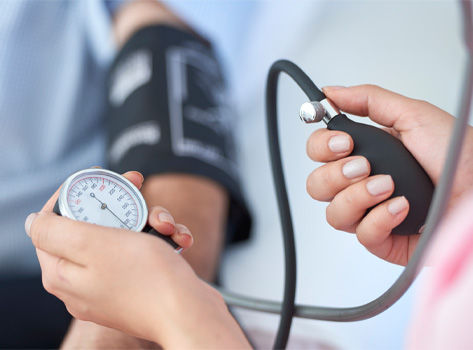
Heart disease does not discriminate. It can happen to anyone. And while genetics play a big role, it’s not the only factor.
Brandon Calenda, MD, a cardiologist with Atlantic Health System, shares the top 5 things raising your chances of developing heart disease and how you can take control to lower your heart risk.
The first step is knowing what the risks are. While some factors, like age, gender, race, ethnicity and family history of heart disease are out of your control, there are things you can do that have a big impact. Here are the top 5 risk factors you can control:
1. Smoking
Everyone knows smoking is bad for your lungs, but did you know it’s just as bad for your heart? Smoking increases inflammation in your arteries and blood vessels, and raises your blood pressure. This applies to smoking marijuana, too. The worst part? Smoking just one cigarette a day substantially increases your risk for a heart attack, even in younger populations.
2. Diet
When it comes to diet, research supports two things:
- Eating five or more servings of fruits and vegetables a day lowers your risk for heart disease.
- Regularly eating a diet high in sodium (salt) and full of processed foods significantly raises your risk for heart disease.
That’s not to say you can never eat a cheeseburger. Everything in moderation.
3. High blood pressure
Classified as anything above 130/80, high blood pressure puts stress on the heart, blood vessels and kidneys. What makes it so dangerous is that there are no symptoms and it often goes undetected for a long time. To reduce your risk, have your blood pressure checked by your doctor or at your local pharmacy, eat a healthy diet, move your body regularly (exercise) and maintain a healthy weight to help keep your blood pressure in check.
4. Diabetes and high blood sugar
Having excess glucose (sugar) in your blood leads to inflammation in your arteries. While type 1 diabetes is an autoimmune disease, high blood sugar and type 2 diabetes are often within your control. Maintaining a healthy weight is vital to lowering your risk. To improve your blood sugar levels, clean up your diet by cutting out or reducing processed foods and sweets. If you have diabetes, work with your medical team to manage the condition.
5. High cholesterol
When thinking about cholesterol, we’re most concerned with low-density lipoprotein (LDL), known as the “bad” cholesterol. An LDL over 160 may mean that plaque is building up in your arteries. Clogged arteries can lead to heart disease. Lower your risk by eating a healthy diet and having your cholesterol tested annually.
Extra Credit: Physical Activity
You’ve probably heard that sitting is the new smoking. An inactive lifestyle does contribute to heart disease risk, but exercise alone is not enough to mitigate your risk if you don’t address the top 5 factors, too.
Knowledge + Action = Power
Now that you know the top risk factors, you can take action.
“The majority of all heart disease is preventable if you minimize your risk factors,” says Dr. Calenda. “Choose healthier habits and take control of your medical conditions. Behaviors are cumulative. Day after day, week after week, month after month – it all adds up.”
Even if you do all the right things, Dr. Calenda says it’s still important to know your family history with heart disease because heredity play a significant role in your risk level. You can’t control your genetics, but you can be proactive.
“Learn your family history and talk to your doctor. Get your blood pressure, blood sugar and blood cholesterol tested annually and if you’re over 40 with a strong family history of heart disease, consider having a coronary calcium score test done to check for early hardening of arteries.”
Lowering your heart risk is possible. You have the power.
Be Proactive About Heart Health
Stay up to date with your annual visits to prevent and detect more serious issues and learn about risk factors for heart disease.
Related Articles
How Cardiologists Protect Their Own Hearts
When it comes to hearts, no one knows more about how to keep them healthy than the specialists who treat them. Explore the everyday ways Atlantic Health System cardiologists are improving their own heart health – and how you can too.
Five Reasons to Connect With Your Primary Care Doctor
Keeping up with your heart health begins with your primary care doctor. Discover how staying up to date with your annual visits can keep you well -- and prevent or detect serious medical issues at their earliest stages.
Are You Prepared to Help in a Cardiac Emergency?
Cardiac arrest can happen anywhere, and it is important to know that anyone can be ready to respond. Learn how to prepare, so you can protect your loved ones and others.
Take a Heart Health Assessment
The first step to a healthier heart is understanding your risk for heart disease. Answer a few questions about your heart health and history to get your individual results.



